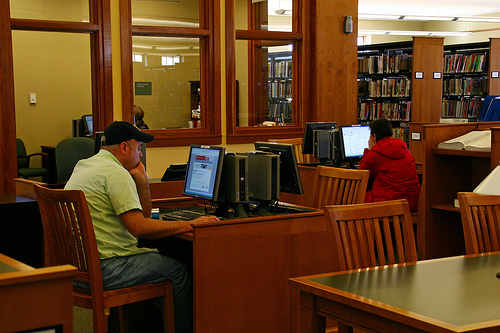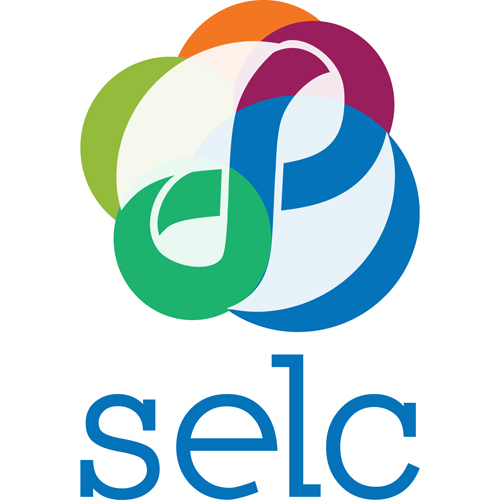UPDATE: We've summarized much of the series this article is part of in a new report, Policies for Shareable Cities: A Sharing Economy Policy Primer for Urban Leaders. Get your free copy here today.
Public libraries are a quintessential sharing institution – a center where citizens access free information and engage in lifelong learning. Library budgets are being cut in cities across the country and my first recommended policy for cities is: Stop doing that!
Libraries play a more important role than ever in ensuring the health and well-being of our communities. Higher education has become more expensive; unemployment is way up; and many people are charting new paths, starting new enterprises, learning to do things themselves, and being forced to become resourceful in new ways. We have a lot to learn and need a great deal of help in accessing and navigating the resources out there.

Libraries offer unique spaces of learning for communities. Photo credit: Gerald Pereira. Used under Creative Commons license.
The way that citizens access a lot of our information has changed dramatically, and this offers a unique opportunity for libraries to do more. The resources that libraries offer are becoming increasingly digitized, which means that libraries will have more physical space to add and enhance functions. Here are some suggestions:
-
Libraries as tool and equipment sharing centers: Libraries could play an important role in preventing overconsumption and accumulation of consumer goods by becoming centers for lending tangible items. In Oakland and Berkeley, California, the public library systems each include a tool lending branch. Tool lending libraries are tremendously useful to citizens and prevent us from buyinga caulking gun or a circular saw for those rareoccasions when we actually need one. Tool lending libraries also come in handy during work days at community gardens, since a tool lending library is a place where you could borrow 20 shovels for the weekend. Public libraries could offer not just tools, but other items, as well, like audio-visual equipment (including projectors and cameras) or recreational equipment that can be used for community block parties and other gatherings. Here’s another interesting example: Some libraries in Canada have Pedometer Lending Programs as a way to encourage patrons to improve their health by walking more.
-
Libraries as workshops: Libraries have long offered patrons access to computer stations for Internet access, research, and word processing. Libraries could take this offering many steps further by giving patrons access to software and equipment useful for graphics, film editing, animation, sound and music editing, and other activities useful in developing businesses and job skills. Libraries could even offer some of the tools and training provided by community workspaces such as TechShop, helping patrons to develop mechanical and fabrication skills.
-
Libraries as skill-sharing centers and community gathering spaces: Libraries offer a wealth of learning opportunities, often provided by librarians or community volunteers. Especially as the cost of community college classes rises, libraries will play an important role in helping community members develop skills and continue their educations. Libraries should prioritize the use of library rooms for community classes and other educational gathering events.
-
Libraries as coworking spaces: This article in PC World suggests designating a space in libraries as a coworking space, which entrepreneurs can use as a shared work space. The article also makes a unique suggestion to ensure that such a use benefits the entire community and not just the coworkers: Have coworkers contribute back to the library by volunteering their time and sharing their skills.
-
Libraries as centers of economic development: The depressed job market has meant that many people are turning to entrepreneurship for the first time, and this is a prime area where libraries can be helpful. The University of Kansas published a set of recommendations in their report, The Role of Public Libraries in Local Economic Development. The recommendations include training librarians on the particular needs of entrepreneurs, providing online resources and databases focused on the needs of businesses, and partnering with Small Business Development Centers and similar organizations to provide resources and training.
How else might a city utilize public libraries in shareable ways? Please post comments below to add to this collection of policy suggestions. Thank you!
This post is one of 15 parts of our Policies for a Shareable City series with the Sustainable Economies Law Center:
- Car Sharing and Parking Sharing
- Ride Sharing
- Bike Sharing
- Shareable Commercial Spaces
- Shareable Housing
- Homes as Sharing Hubs
- Shareable Neighborhoods
- Shareable Workspaces
- Recreational and Green Spaces
- Shareable Rooftops
- Urban Agriculture
- Food Sharing
- Public Libraries
- The Shareable City Employee
- How to Rebuild the City as a Platform









